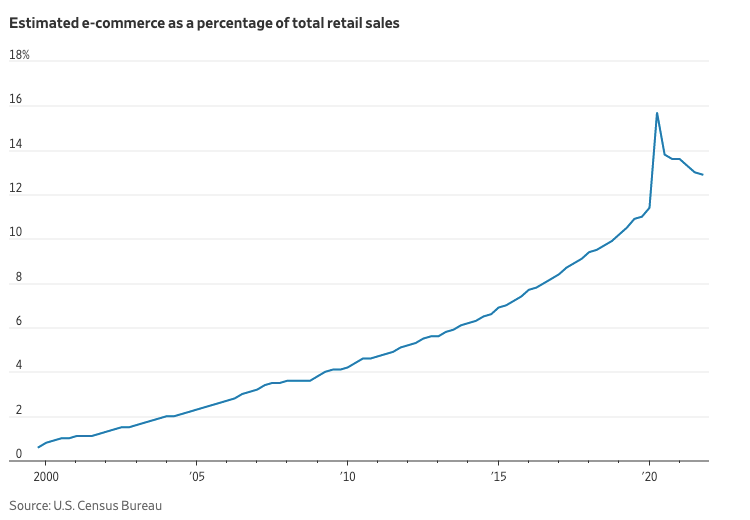E-spending Dips, AI-Content Spam, 'Surveillance Capitalism' in FTC Sights

Stores Come Roaring Back
During 2020 and the phenomenal growth of e-commerce, the question arose: has consumer shopping forever changed? The answer it turns out is yes and no. According to US government data (Q4 2020), non-seasonally adjusted e-commerce was ~15% of total retail sales. Adjusted data made it 13.6%. (Figures can be pushed higher by excluding categories such as restaurants, bars, autos, gas stations.) In Q4 2021, e-commerce was 14.5% (non-adjusted) or 12.9% (adjusted) of total retail – in other words: down. In Q1 2022, online sales again fell year over year. According to Mastercard (via WSJ), online spending saw the first annual decline (3.3%) since 2013. And physical retail store spending was up 11.2%. US consumers have returned to stores and pulled back on e-commerce, which was driven by necessity during the COVID lockdowns.

Our take:
- The simple opposition of stores and e-commerce has never been accurate. Consumers want and use both, based on situational and cost considerations.
- Post-COVID, there's an imperative to more deeply integrate physical and digital capabilities for a better UX. In addition, consumers are now willing to buy a much wider range of things online than pre-pandemic.
- As we've argued, stores support e-commerce. And with CAC up almost 50% over five years, stores offer a less-expensive way to brand build and attract customers.
Can Google Hold Back AI Content Spam?
There are amazing leaps happening in AI. As one example, we've focused on Google's understanding of images. Google's use of AI to understand search queries is another, as are its new auto-generated summaries in Google Docs. A very (very) long article in the NY Times Magazine chronicles the advances AI has made – specifically OpenAI’s GPT-3 – in "understanding" and replicating human language. GPT-3 can generate content at the level of a proficient high-school student. This is either exciting or scary depending on your perspective. Considerable coverage was triggered by a recent comment from Google’s John Mueller, who said that machine-learning-generated content violates Google webmaster guidelines. While Mueller's remarks appear unequivocal, Google's guidelines are a bit more gray, and would seem to allow AI-written content in some situations -- if it was coherent and perhaps human-edited.

Our take:
- AI-generated content, combined with language understanding is going to have a massive impact on multiple fields – for better and worse.
- Does it matter if AI or a person generates the content on a website, provided it's useful and offers the desired information? Maybe not.
- What happens if SERPs get flooded with auto-generated content? This is potentially analogous to what happened with "content farms" in the late-00s until Google killed them with an algorithm change in February, 2011.
FTC Takes On 'Surveillance Capitalism'
There's evidence that privacy legislation in Congress is inching forward. Whether it will become law is uncertain. But regulators in Europe and the US are moving ahead with tighter privacy controls. Europe's Digital Market's Act requires opt-in permission for use of personal data for ad targeting. And recently, FTC Chair Lina Khan forcefully spoke at the IAPP conference (remarks, video) about the dangers of unregulated data collection. She observed, users have little choice but to use digital platforms as a practical matter. So "procedural protections" (i.e., "notice and consent") are outdated and insufficient. "Going forward, I believe we should approach data privacy and security protections by considering substantive limits rather than just procedural protections." Meaning: some data collection should simply be off limits.

Our take:
- FTC Chair Khan's remarks go to the heart of the most-common internet business model: free services for data. Let's see what the FTC does.
- A judiciary (SCOTUS) increasingly hostile to government regulation could decide some of this, if pursued, is beyond the scope of FTC authority.
- AI-based modeling can potentially compensate for the loss of data for marketers. But the digital-data paradigm is now irrevocably shifting.
Recent Analysis
- Near Memo episode 60: Paid-search domination, "self-updating" (Google) maps, Mobile SERPs are becoming image SERPs.
- ICYMI: Google Review Growth Is Down, by Mike Blumenthal.
Short Takes
- Pinterest for WooCommerce makes product catalogs shoppable Pins.
- Houston Astros installing Amazon's cashierless tech in their stadium.
- First look at Twitter's edit button for Twitter Blue subscribers.
- Usual suspects: 2016 speculation on who might buy Twitter and why.
- Opinion: Elon Musk doesn't understand content moderation.
- Confirmation bias: Unforeseen social consequences of social media.
- Facial rec. of war dead used to generate dissent in Russia (WaPo).
- Tech company lobbyists coopting privacy legislation in multiple states.
- Salary disclosure law in WA state could spawn others, change tech.
- AR glasses B2B use cases are emerging, B2C not as much.
- AR expected to change mobile marketing, will take longer than expected.
- AI monitors student expressions on video to determine engagement.
- Videoconferencing apps reportedly listening even when mic is muted.
- GoPuff trying to win in the dubious "instant delivery" market (NYT).
- CA planning to ban the sale of new gas-powered cars by 2035.
Listen to our latest podcast.

How can we make this better? Email us with suggestions and recommendations.

